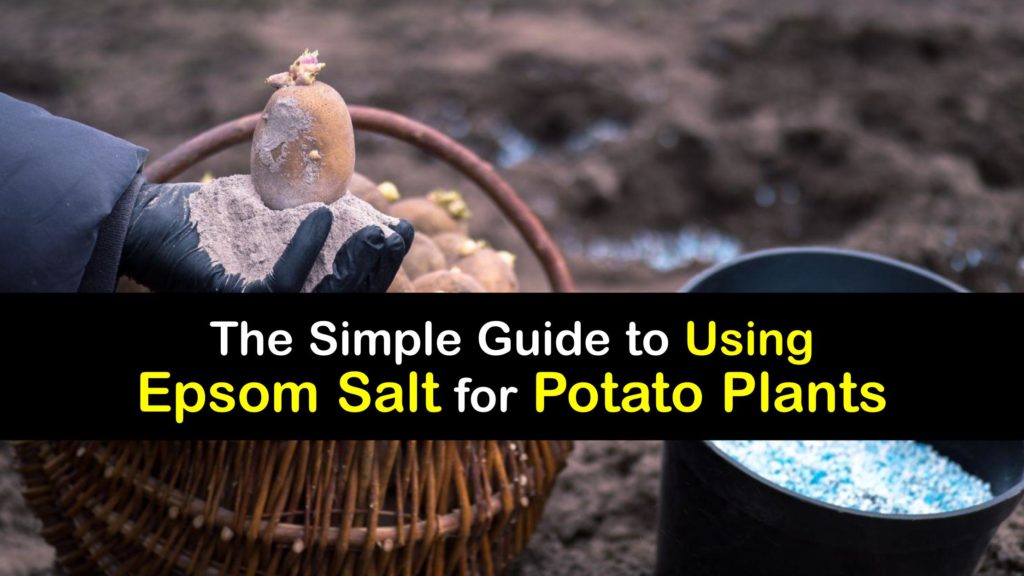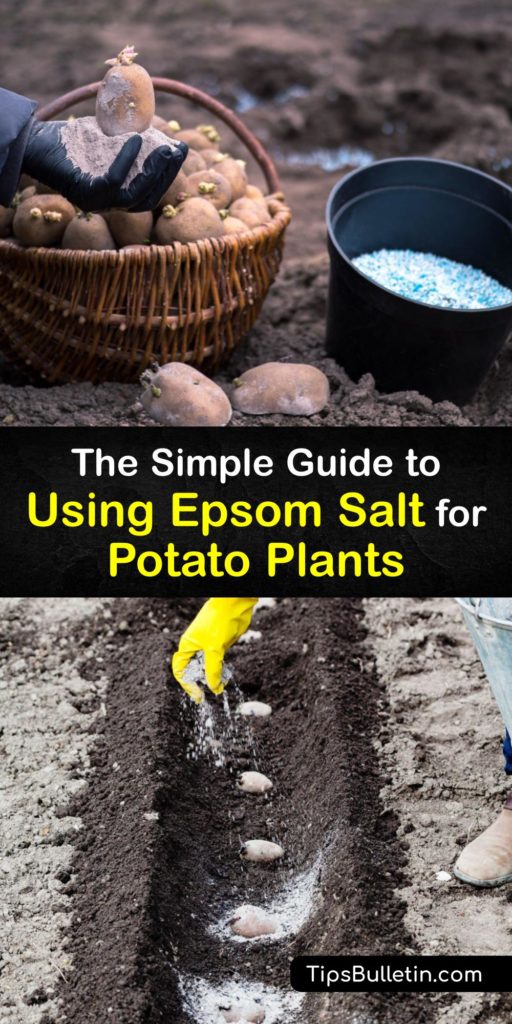It’s time to start preparing for planting potatoes. However, if your garden soil has a magnesium deficiency, it’s essential to find ways to add this nutrient during the growing process. If you’ve heard about using Epsom salt for potatoes, you’re probably wondering how this is possible since we generally use it for easing aching muscles.
Is Epsom salt good for plants? Surprisingly, this naturally occurring mineral salt has many other uses around the home, including feeding potato plants, tomato plants, and other veggies. In addition, it’s an inexpensive and popular ingredient for organic gardening, and it helps plants grow to their best potential.
Epsom salt boosts the overall health of regular and sweet potatoes, but it’s also ideal for pest control since it deters harmful insects from your crop. Unlike commercial fertilizers, there is little danger of overusing the salt on your plants, so it is safe to use even if you’re a beginning gardener.

Ways to Use Epsom Salt for Potato Plants
Is Epsom salt good for potatoes? The answer is yes. Epsom salt contains hydrated magnesium sulfate, which is necessary for plant growth, allowing the plant to take in other vital nutrients like phosphorus and nitrogen. Use Epsom salt for houseplant plants and those in the garden for increased growth and health.

If you test the soil pH and find it’s low in nutrients, Epsom salt may be just what you need. Learn what this mineral is and how it’s helpful when growing potatoes. We show you how to use Epsom salt for sweet potatoes and russet potatoes by making a foliar spray and applying it to the soil to raise magnesium levels.
Is Epsom Salt Good for Potatoes?
You plant your seed potato when the soil temperature is just right. However, you perform a soil test and find that the dirt has a calcium deficiency, and consider using Epsom salt to rectify the problem. While this mineral salt is helpful for sore feet and an aching body, is Epsom salt good for potatoes?
Epsom Salt
Is Epsom salt good for potato plants? After planting a potato seed and it produces a short plant height or small potatoes or potato tubers, there’s a chance they are nutrient deficient. While we don’t usually think of Epsom salt and potatoes as a good combination, this mineral benefits potato plants and generally does not create acidic soil.
Similar to when you use Epsom salt for strawberry plants and tomatoes, it gives potatoes a boost of magnesium which stimulates biochemical reactions and builds strong cell walls within the plant through the growth process. In addition, it prevents blossom end rot on tomatoes, a condition caused by low calcium levels.
Epsom Salt for Potatoes as a Foliar Spray
A foliar spray introduces nutrients into the stems, foliage, and flowers of a plant, and it’s a great way to give your potatoes a boost of calcium during the growing season. Fertilize pepper plants with Epsom salt, too. Prepare and apply a fertilizer spray with Epson salt.
Fill a sprayer with a gallon of water and add two tablespoons of Epsom salt. Shake the solution to dissolve the salt and spray the fertilizer over your plants, whether you are using Epsom salt for houseplants or your potatoes. Spritz it on the leaves, stems, and soil and repeat once a month. If you prefer this watering method every two weeks, cut the salt back to one tablespoon.
If you have a problem with weeds in the garden, you can also make your own weed killer with Epsom salt. Use caution around plants you want to keep.
How to Use Epsom Salt for Potato Plants in the Soil
Using Epsom salt for potato plants or a tomato plant increases soil calcium and reduces incidents of blossom end rot and poor plant nutrition. It’s the best organic fertilizer for potatoes to start. Here is how to use Epsom salt for potatoes by applying it directly to the soil.
There are a couple of techniques for using Epsom salt as a fertilizer. First, to encourage seed germination and healthy potato production, mix a handful of dry Epsom salt into the soil before you plant potatoes but after you get potatoes to sprout eyes. Potatoes should be planted around 12 inches apart to yield the best results.
To feed your plants a liquid fertilizer, mix no more than a half cup of Epsom salt with a gallon of water in a watering can and pour the solution around the base of your plants.
Potted plants and gardens lose nutrients like magnesium over time, causing plants to struggle, and it’s vital to amend the soil with organic matter and fertilize your plants for optimal growth. Fortunately, Epsom salt is a natural cure for magnesium deficient soils, and it’s easier to use than commercial fertilizers.

Using Epsom salt for potatoes produces healthy and productive potato plants, so why not share our Epsom salt potato plant feeding guide with the veggie-growers in your life on Pinterest and Facebook?